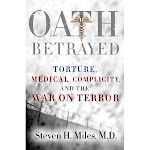Bioethicist Steven Miles Responds to Latest American Psychological Association Board Letter on Interrogations Policy
June 18, 2009
APA Board of Directors
Re: Your Open Letter to APA Membership
of June 18, 2009 on Psychologists and Torture
Dear Board,
I have been extensively involved in studying the issue of health professional involvement in abusive interrogations in the war on terror prisons. Your June 18, 2009 letter to the APA membership is a welcome but incomplete shift of APA policy.
It is welcome because it states that the APA has retreated from its untenable insistence that no psychologists were involved in torture or other forms of cruel, inhuman, or degrading treatment. This official acknowledgment is new but the fact of these abuses has been established for several years. Speaking in their official capacities, APA’s former President, Dr. Gerald Kootcher, and its ethics officer, Dr. Stephen Behnke, have repeatedly issued ungrounded denials of these facts despite having ample information that those denials were false.
The APA Board’s letter was also welcome because, it states that the 2008 petition, Psychologists and Unlawful Detention Settings with a Focus on National Security, would be fully integrated into APA policy. That resolution was openly opposed by the Defense Department operating those same detention centers. After passage by the membership who voted in accordance with APA by-laws, APA governance gave that position second class status by asserting that since it did not pass through the conventional internal ethics policy making process, it could not serve as a standard for assessing the conduct of APA members.
The current Board’s position, as outlined in the June 18 letter, remains incomplete.
1. It lays out a process for incorporating the 2008 referendum into APA policy but it does not give a timeline.
2. Its newly passed “No defense to torture under the APA ethics code” statement (http://www.apa.org/releases/ethics-statement-torture.pdf) is a hastily written statement that does not define torture; ignores the concept of cruel, inhuman, and degrading treatment; does not address the duty to report observing such abuse and so on.
3. It does not acknowledge the failure of the APA to manage the conflicts of interest in membership and process of the PENS Task Force. These failures stained the reputation of APA, divided APA’s membership, separated APA from the larger community of health oriented professionals and produced a report that was tailor made to the design, policies, and operation of previous United States system of abusive interrogations.
4. It states the APA will monitor and will investigate reports of ethical misconduct by APA members but it does not address the status of previously filed allegations.
This progress and these omissions suggest steps that the APA Board should now take.
1. It should entirely retract the PENS Task Force report.
2. It should reassign Dr. Stephen Behnke from the position of Director of the APA Ethics Office. His credibility in that position has been irredeemably compromised by his management of the conflicts of interest of the PENS Task Force, his repeated categorical denials of psychologist and APA member involvement in abusive interrogations, and his Office’s handling of formal allegations about the APA member’s complicity with abusive interrogations. He cannot serve effectively in his position.
3. It should endorse the Declaration of Madrid and Declaration of Tokyo, substituting in the word psychologist for psychiatrist or physician. Perhaps this could be a provisional time-limited measure until APA reconstitutes a process for creating a specific standard for psychologists.
4. The Ethics Office should clarify the status of proceedings and findings (if upheld) of psychologists against whom formal complaints of complicity with abusive interrogation have been filed.
These steps would go a long way to putting the APA on a new direction. They would create a clean break with its past. They would bring the APA back into the international community of health professions. They would enable it to speak with moral authority on behalf of psychologists who are endangered by speaking out against torture in other nations.
Sincerely,
Steven H. Miles, MD
Professor of Medicine
Center for Bioethics
University of Minnesota
N504 Boynton
410 Church Street SE
Minneapolis, MN 55455
612-624-9440
miles001@umn.edu
BMJ Opinion has moved to bmj.com
-
The BMJ continues to publish a wide range of opinion pieces. These are now
published on bmj.com. https://www.bmj.com/news/opinion For more information
ab...
4 years ago




